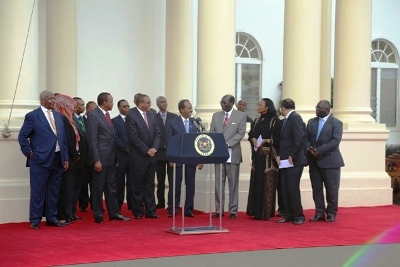Regional leaders hold summit in Kenya on S. Sudan crisis
December 27, 2013 (JUBA) – African leaders from member countries of the Inter-Governmental Authority on Development (IGAD) on Friday held a special summit in the Kenyan capital, Nairobi, to discuss how the region can avert a current political crisis in South Sudan from developing into a full blown civil war.

The leaders each held separate closed door meetings with president Kiir before a joint cabinet briefing at which South Sudanese government officials announced that visiting African leaders had welcomed the commitment of Kiir’s administration for an immediate cessation of hostilities, calling on armed opposition members loyal to former vice-president Riek Machar to make similar commitments in order for dialogue to proceed.
South Sudan’s foreign minister, Barnaba Marial Benjamin attended the special summit of IGAD member countries, saying his government was ready for dialogue.
“President Salva Kiir Mayardit had openly pledged full commitment to quickly resolve political differences through peaceful dialogue. The government is therefore ready for talks with the former vice-president, Riek Machar”, he told reporters at Juba Airport on Friday prior to his departure for Nairobi.
Marial, however, said president Kiir was unable to attend the summit because he already held extensive discussions with African leaders during their Juba visits.
“Everything they (African leaders) wanted to hear from the government and the president was shared with them”, he said.
Many government critics, including Rebecca Nyandeng, widow of the founding leader of South Sudan’s ruling Sudan People’s Liberation Movement (SPLM), John Garang de Mabior, have expressed optimism about the talks and regional intervention.
“I have said violence does not solve political issues. If we had [of] sat down long time ago as leaders, we would have ironed out all these issues and concerns amicably”, Nyandeng told Sudan Tribune on Friday.
Those who had died during South Sudan’s long struggle for independence would not have been happy with current developments in the country, she further stressed.
FIGHTING RAGES IN MALAKAL
While regional efforts are quickly grabbing attention, fighting between forces loyal to the government in Juba and those who switched allegiance is continuing to rage around Malakal town, the capital of the country’s second largest oil producer, Upper Nile state, where thousands remain out of work since Tuesday.
“There has been fighting since Tuesday. The government remains in control of the airport because this is where there are heavy artilleries, including tanks. The anti-government elements are in control of town. They are actually in control but it appears they are in weak position, because they are not getting any reinforcement like the government forces”, a local journalist who has fled to a UN camp in Malakal told Sudan Tribune on Friday.
More than 500 people have been killed since violence erupted on 15 December, according to official figures, although aid agencies and other sources on the ground put the true death toll in the tens of thousands.
Thousands of people have taken shelter at UN bases in Juba after fleeing their homes, with violence spreading to Jonglei and Unity states.
Many observers had predicted that Kiir was always going to have a hard time running the country after falling out with Machar.
Both men are former rebel fighters and senior figures in the SPLM, which led South Sudan to independence after a more than two-decade-long civil war with Sudan.
Prior to his removal, Machar had criticised the leadership style of president Kiir, revealing the bitter divisions within the SPLM’s inner circles.
A statement released by president Kiir a day after violence erupted described the incident as an attempted coup, saying plotters had swung into action following a SPLM meeting in Juba.
“An unidentified person fired in the air and escaped”, Kiir told members of parliament this week. That incident was followed later by an attack on the army headquarters near Juba University, which Kiir described as “something well-planned and coordinated within their (his political opponents) supporters in the armed forces”.
(ST)
